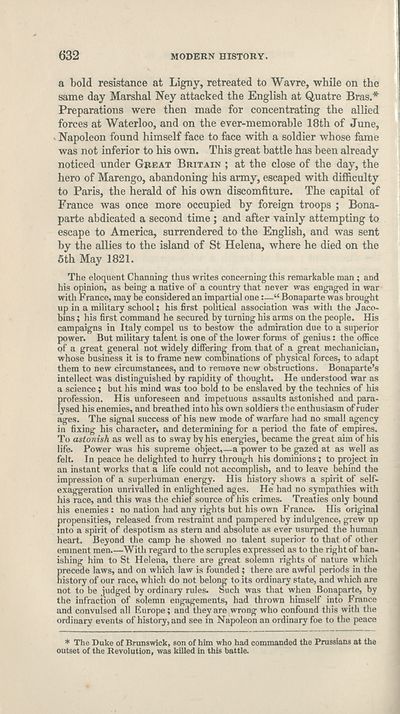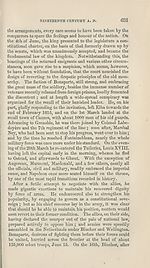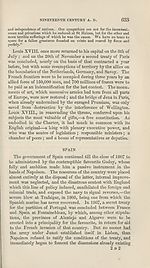Download files
Complete book:
Individual page:
Thumbnail gallery: Grid view | List view

632
MODERN HISTORY.
a bold resistance at Ligny, retreated to Wavre, while on the
same day Marshal Ney attacked the English at Quatre Bras.*
Preparations were then made for concentrating the allied
forces at Waterloo, and on the ever-memorable 18th of June,
Napoleon found himself face to face with a soldier whose fame
was not inferior to his own. This great battle has been already
noticed under Great Britain ; at the close of the day, the
hero of Marengo, abandoning his army, escaped with difficulty
to Paris, the herald of his own discomfiture. The capital of
France was once more occupied by foreign troops ; Bona¬
parte abdicated a second time ; and after vainly attempting to
escape to America, surrendered to the English, and was sent
by the allies to the island of St Helena, where he died on the
5th May 1821.
The eloquent Channing thus writes concerning this remarkable man ; and
his opinion, as being a native of a country that never was engaged in war
with France, may be considered an impartial one:—“ Bonaparte was brought
up in a military school; his first political association was with the Jaco¬
bins ; his first command he secured by turning his arms on the people. His
campaigns in Italy compel us to bestow the admiration due to a superior
power. But military talent is one of the lower forms of genius: the office
of a great general not widely differing from that of a great mechanician,
whose business it is to frame new combinations of physical forces, to adapt
them to new circumstances, and to remove new obstructions. Bonaparte’s
intellect was distinguished by rapidity of thought. He understood war as
a science; but his mind was too bold to be enslaved by the technics of his
profession. His unforeseen and impetuous assaults astonished and para¬
lysed his enemies, and breathed into his own soldiers the enthusiasm of ruder
ages. The signal success of his new mode of warfare had no small agency
in fixing his character, and determining for a period the fate of empires.
To astonish as well as to sway by his energies, became the great aim of his
life. Power was his supreme object,—a power to be gazed at as well as
felt In peace he delighted to hurry through his dominions ; to project in
an instant works that a life could not accomplish, and to leave behind the
impression of a superhuman energy. His history shows a spirit of self¬
exaggeration unrivalled in enlightened ages. He* had no sympathies with
his race, and this was the chief source ot his crimes. Treaties only bound
his enemies : no nation had any rights but his own France. His original
propensities, released from restraint and pampered by indulgence, grew up
into a spirit of despotism as stern and absolute as ever usurped the human
heart. Beyond the camp he showed no talent superior to that of other
eminent men With regard to the scruples expressed as to the right of ban¬
ishing him to St Helena, there are great solemn rights of nature which
precede laws, and on which law is founded; there are awful periods in the
history of our race, which do not belong to its ordinary state, and which are
not to be judged by ordinary rules. Such was that when Bonaparte, by
the infraction of solemn engagements, had thrown himself into France
and convulsed all Europe; and they are wrong who confound this with the
ordinary events of history, and see in Napoleon an ordinary foe to the peace
* The Duke of Brunswick, son of him who had commanded the Prussians at the
outset of the Revolution, was killed in this battle.
MODERN HISTORY.
a bold resistance at Ligny, retreated to Wavre, while on the
same day Marshal Ney attacked the English at Quatre Bras.*
Preparations were then made for concentrating the allied
forces at Waterloo, and on the ever-memorable 18th of June,
Napoleon found himself face to face with a soldier whose fame
was not inferior to his own. This great battle has been already
noticed under Great Britain ; at the close of the day, the
hero of Marengo, abandoning his army, escaped with difficulty
to Paris, the herald of his own discomfiture. The capital of
France was once more occupied by foreign troops ; Bona¬
parte abdicated a second time ; and after vainly attempting to
escape to America, surrendered to the English, and was sent
by the allies to the island of St Helena, where he died on the
5th May 1821.
The eloquent Channing thus writes concerning this remarkable man ; and
his opinion, as being a native of a country that never was engaged in war
with France, may be considered an impartial one:—“ Bonaparte was brought
up in a military school; his first political association was with the Jaco¬
bins ; his first command he secured by turning his arms on the people. His
campaigns in Italy compel us to bestow the admiration due to a superior
power. But military talent is one of the lower forms of genius: the office
of a great general not widely differing from that of a great mechanician,
whose business it is to frame new combinations of physical forces, to adapt
them to new circumstances, and to remove new obstructions. Bonaparte’s
intellect was distinguished by rapidity of thought. He understood war as
a science; but his mind was too bold to be enslaved by the technics of his
profession. His unforeseen and impetuous assaults astonished and para¬
lysed his enemies, and breathed into his own soldiers the enthusiasm of ruder
ages. The signal success of his new mode of warfare had no small agency
in fixing his character, and determining for a period the fate of empires.
To astonish as well as to sway by his energies, became the great aim of his
life. Power was his supreme object,—a power to be gazed at as well as
felt In peace he delighted to hurry through his dominions ; to project in
an instant works that a life could not accomplish, and to leave behind the
impression of a superhuman energy. His history shows a spirit of self¬
exaggeration unrivalled in enlightened ages. He* had no sympathies with
his race, and this was the chief source ot his crimes. Treaties only bound
his enemies : no nation had any rights but his own France. His original
propensities, released from restraint and pampered by indulgence, grew up
into a spirit of despotism as stern and absolute as ever usurped the human
heart. Beyond the camp he showed no talent superior to that of other
eminent men With regard to the scruples expressed as to the right of ban¬
ishing him to St Helena, there are great solemn rights of nature which
precede laws, and on which law is founded; there are awful periods in the
history of our race, which do not belong to its ordinary state, and which are
not to be judged by ordinary rules. Such was that when Bonaparte, by
the infraction of solemn engagements, had thrown himself into France
and convulsed all Europe; and they are wrong who confound this with the
ordinary events of history, and see in Napoleon an ordinary foe to the peace
* The Duke of Brunswick, son of him who had commanded the Prussians at the
outset of the Revolution, was killed in this battle.
Set display mode to:
![]() Universal Viewer |
Universal Viewer | ![]() Mirador |
Large image | Transcription
Mirador |
Large image | Transcription
| Antiquarian books of Scotland > Education > Elements of universal history on a new and systematic plan > (652) |
|---|
| Permanent URL | https://digital.nls.uk/127587964 |
|---|
| Description | Thousands of printed books from the Antiquarian Books of Scotland collection which dates from 1641 to the 1980s. The collection consists of 14,800 books which were published in Scotland or have a Scottish connection, e.g. through the author, printer or owner. Subjects covered include sport, education, diseases, adventure, occupations, Jacobites, politics and religion. Among the 29 languages represented are English, Gaelic, Italian, French, Russian and Swedish. |
|---|

